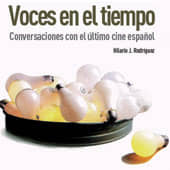The
'Mirror Outlooks' section was created by
ALCINE in 1997. The initiative aimed to discuss Spain's most recent film production. Last year the Festival took up the same model again for
'Viewpoints on a new millennium'. ALCINE37 is pursuing the same aims this year with the parallel
'Contemporary Voices' section. The main thrust of the section is the
book entitled 'Contemporary Voices. Conversations with the latest in Spanish cinema', which includes interviews with fifteen of the most important directors over recent years. The publication is complemented by an exhibition
'Through my eyes' and
projections that combine to paint a picture of Spanish film at this moment in time.
Sixteen feature films corresponding to the directors interviewed in the book constitute a
faithful reflection of the development of Spanish cinema over the last decade. When first screened some of the films were backed by the public and lauded by the critics turning their creators into household names and reference points in Spanish cinema. Others arrived with less fanfare, ready to become loudhailers for the thoughts of their authors, who in some cases are still unknown talents for the public at large. They all represent
new approaches to the seventh art, a discipline in constant development.
Film Selection
The
'Contemporary Voices' selection comprises
'La primera noche de mi vida' (Miguel Albadalejo),
'Darkness' (Jaume Balagueró),
'Sé quién eres' (Patricia Ferreira),
'Intacto' (Juan Carlos Fresnadillo),
'Hotel Room' (Cesc Gay),
'El milagro de P. Tinto' (Javier Fesser),
'Las voces de la noche' (Salvador García Ruiz),
'La suerte dormida' (Ángeles González-Sinde),
'Noviembre' (Achero Mañas),
'Otros días vendrán' (Eduard Cortés),
'La leyenda del tiempo' (Isaki Lacuesta),
'Días de agosto' (Marc Recha),
'El traje' (Alberto Rodríguez),
'Solas' (Benito Zambrano),
'El juego de Cuba' and
'Malas temporadas' (both by Manuel Martín Cuenca). Together they form a heterogeneous mosaic of Spanish cinema, a route description of the path taken by the film industry in this country.
